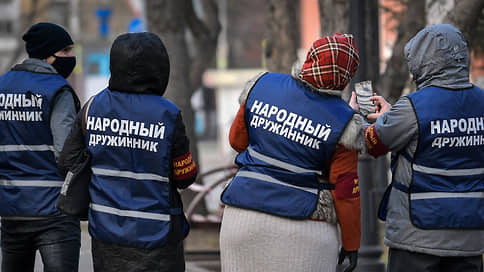The HRC proposed to change the rules for the participation of citizens in the protection of order
[ad_1]

Kirill Kabanov, a member of the Presidential Human Rights Council (HRC) and the head of the National Anti-Corruption Committee, announced the preparation of proposals for adjusting legislation in the field of Russian participation in the protection of public order and the corresponding “consultations with responsible state bodies”. Mr. Kabanov, noting that “against the background of the SVO, there are more and more proposals to create structures in order to attract the forces of civil society to ensure public safety,” calls for a review of the functions and status of combatants. One of the co-authors of the law “On the Participation of Citizens in the Protection of Public Order”, adopted in 2014, State Duma deputy Alexander Khinshtein urged not to rush and “study in detail what is missing in the legislation today.”
On the preparation of proposals to change the legislation governing the activities of people’s squads, Kirill Kabanov said in his Telegram channel: “Recently, against the background of the SVO, there are more and more proposals to create various structures in order to attract the forces of civil society to ensure public safety. We are preparing proposals for changing the legislation, we are consulting with the responsible state bodies.” A member of the Human Rights Council explained to Kommersant that the need to involve citizens in the function of ensuring public order is due to “a general sense of concern and the likelihood of terrorist attacks.”
Mr. Kabanov made it clear that in this connection it is necessary to streamline the initiative of the regional authorities. “Someone is looking for explosive devices, someone is watching drones during big events,” he listed. “Today, there is a real shortage of forces and means in law enforcement agencies. At the same time, the number of threats is not decreasing, but only increasing.” So, in December last year, the governor of the Belgorod region, Vyacheslav Gladkov, announced the creation of territorial defense, and a few weeks ago he already announced the purchase of 400 weapons for the militias (see Kommersant from July 17th And August 3rd). “We need to understand how to create a unified system in which people can participate in the process of ensuring public safety,” the HRC member urged.
The activities of the people’s squads are regulated by the Federal Law “On the Participation of Citizens in the Protection of Public Order”, adopted in April 2014. “This is a framework law,” Mr. Kabanov claims. “People can participate in ensuring public security at the request of the Ministry of Internal Affairs or regional authorities, but their legal status is not defined.” The initiative, he said, is to give citizens involved in maintaining public order the status of a law enforcement officer: “We need a law of direct action with prescribed procedures, guarantees and the definition of vigilantes.” The HRC member emphasizes that the current volunteer assistants to the authorities are almost completely limited in their actions, and explains: “They cannot take real measures – use violence against offenders. In the event of a threat to life and health, the combatants can react, but they are not sent to places where there is a threat.”
One of the co-authors of the 2014 law, State Duma deputy Alexander Khinshtein, in a conversation with Kommersant, acknowledged the increased need to involve citizens in law enforcement, but did not agree with criticism of the norms in force in this area. “When a citizen participates in the protection of public order, for example, acts as part of a joint patrol, any attack and any illegal actions against him are qualified as an attack on a representative of the authorities,” he recalled. “In addition to the federal law “On the participation of citizens in the protection of public order,” there a number of by-laws that determine the procedure for the functioning of people’s squads. The deputy urged first “to study in detail what is missing in the legislation today.”
Mr. Kabanov told Kommersant that he is currently consulting on the text of the document with the Ministry of Internal Affairs and the National Guard: “For now, the discussion is being held behind closed doors. We hope to reach a real formalized initiative in the next six months.” From his words, however, it follows that the training of combatants can be taken over by the National Guard, which is already preparing private security guards. “People will spend one or two days studying, preparing and passing minimum exams,” he says. “Training costs a penny—five or six thousand rubles. That is, only the monthly salary of a patrolman covers the training of several vigilantes.” Whether the system of squads will be subordinated to one of the law enforcement agencies, the HRC representative did not explain.
The head of the Human Rights Council, Valery Fadeev, told Kommersant that Kirill Kabanov’s proposal has not yet been discussed within the framework of the Human Rights Council, “therefore, there is no official position of the Human Rights Council yet.”
[ad_2]
Source link








